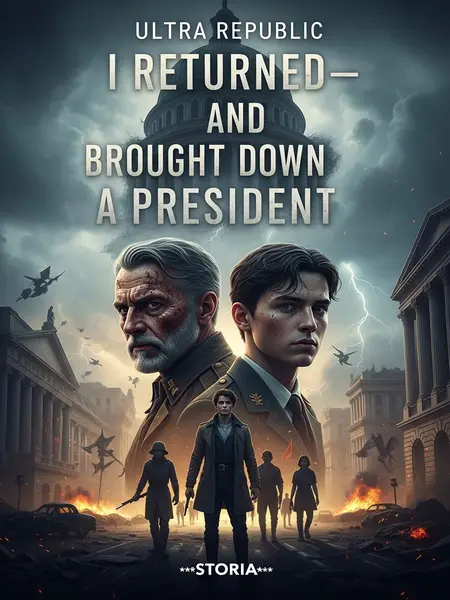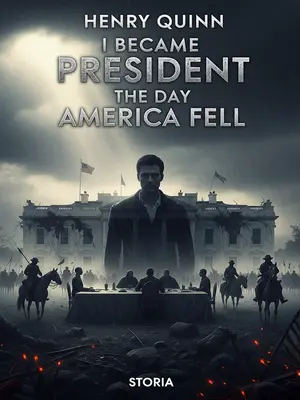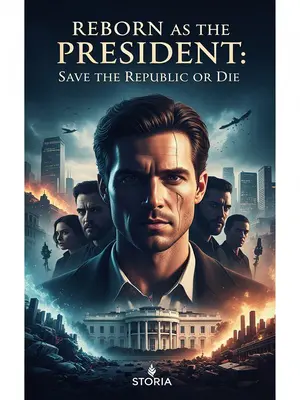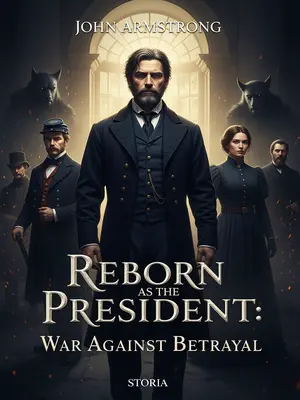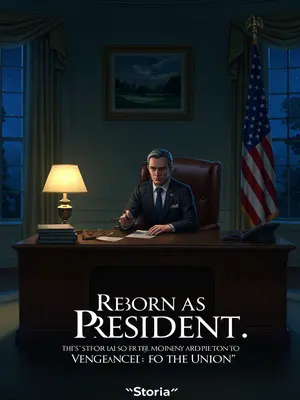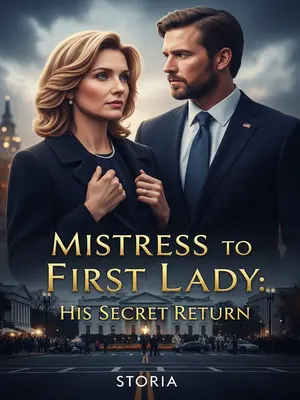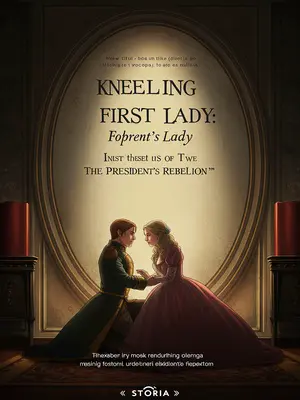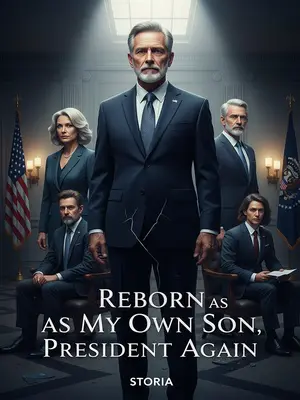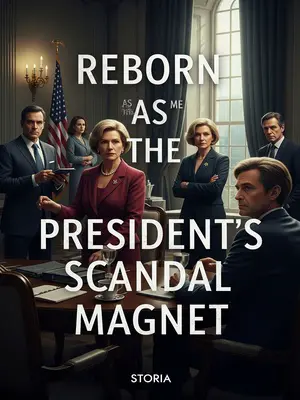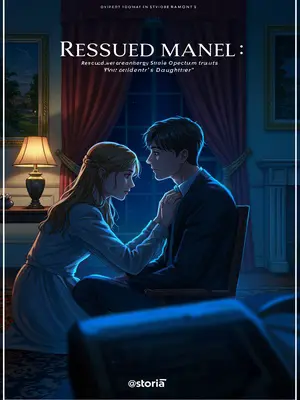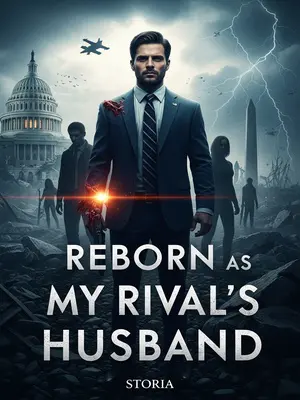Chapter 2: Ghosts Bring Letters in the Rain
He tried to look casual, but his curiosity was obvious. He’d heard stories, but none that matched the reverence in Daniel’s voice. He felt a little foolish not knowing.
“You know what the late President did before politics?” Daniel asked, eyebrow raised. He let the question hang, like a dare.
Daniel’s eyes twinkled, inviting the new guy into the fold. The question hung in the air, almost rhetorical, but the silence said: go on, ask.
Who didn’t know that President Langley once made a living fixing fences and selling boots? It was legend—part of every childhood in the Republic.
It was the kind of story every kid in the Republic grew up hearing—how Langley had worked his way up from nothing, his hands as rough as any rancher’s, his word as solid as oak. Folks still talked about the boots he’d patched, the fences he’d mended, and the way he’d tip his hat to anyone who passed by. You didn’t forget a man like that.
The storage manager suddenly understood. “Wait—is that cap made by the late President himself?” He almost laughed at the thought, but the look on Daniel’s face stopped him.
His voice rose with surprise, drawing a few glances from the men nearby. He caught himself, lowering his voice, but the idea seemed almost too big to believe. Was he really holding a piece of history?
The late President was known for his kindness to the wise, and was skilled at braiding rope and patching up hats. It was said that while drilling the National Guard in Savannah, the late President personally sewed a baseball cap and gave it to Chief Whitmore. The Chief had even publicly teased him, asking if the President had no great ambitions, why waste time on such things? The President just laughed and said it was for fun. Some stories, you just couldn’t make up.
The tale was legendary. Folks said Langley’s hands could fix anything—boots, hats, even broken spirits. That day in Savannah, the President had sat cross-legged in the grass, needle flashing, while the National Guard watched in awe. When he finished, he tossed the cap to Chief Whitmore with a wink, and the men cheered like they’d just won the pennant. It was the kind of memory that stuck around.
He never made another after that. That cap was one of a kind, and everyone knew it.
The cap became a relic, passed down like a family Bible. Some said it brought luck, others said it carried the weight of every promise Langley ever made. Either way, it was more than just a hat.
So the manager was even more confused. His hands fidgeted, mind racing—how could Ben Hayes have ended up with it?
He furrowed his brow, trying to piece it all together. It didn’t add up. Not unless there was more to the story than anyone had told him.
When General Hayes joined, the late President had already passed away for years; the two had never even met. How could the late President have given the General a cap? The question gnawed at him, but he kept it to himself.
The question hung in the air, uncomfortable and raw. The new manager shifted, suddenly aware of how little he really knew about the men he worked for. He felt like an outsider all over again.
Daniel Price turned to look at Ben Hayes, who stood alone outside the tent door, and his voice grew quiet. “That cap was given to Chief Whitmore by the late President.” You could hear the respect in his tone, the kind reserved for legends.
He spoke with the kind of respect reserved for legends. The words carried a weight that made even the most skeptical listener believe, if only for a moment. The silence was almost reverent.
“One day, the General was at the Chief’s house. The Chief saw the blazing sun outside and handed the cap to the General. When the General came to Red Creek, the only thing he brought with him was this cap.” Daniel’s voice softened, the memory hanging between them like a benediction.
Daniel’s voice softened, almost reverent. The image was vivid: a sun-baked porch, two old friends sharing a quiet moment, the cap passing from one hand to another like a blessing. For a second, the world felt smaller, kinder.
“The General’s from the Hayes family of Maple Heights—a big name in those parts—famous since he was a kid, but his whole life, the only one he served was the Chief. The only one he was loyal to was the one the Chief was loyal to. The only ambition he held was the Chief’s ambition... And the only thing he took joy in was the Chief’s joy.” Daniel paused, letting the truth settle.
He let the words linger, the truth of them settling over the small group. Loyalty like that was rare, and everyone knew it. The silence felt sacred.
The storage manager was shaken, and he turned to look. His throat felt dry, and for a moment, he wished he hadn’t said a word.
For the first time, he saw the General not as a relic, but as a man who had carried someone else’s dreams for a lifetime. The realization stung, and he looked away, ashamed of his earlier doubts. His hands trembled, guilt eating at him.
A man in a brocade jacket, already over fifty, his once-handsome features now deep and lonely, wearing a baseball cap that didn’t belong to him. The image stuck in his mind, haunting and sad.
The General’s silhouette was framed by the tent’s entrance, the cap perched on his head like a memory that refused to fade. He looked older than his years, his eyes fixed on a horizon only he could see. For a second, the storage manager wondered what he was seeing.
The Republic had entered its twilight, with endless internal strife and political infighting, and the people just wanted peace. The old days were gone, and everyone knew it.
There was a heaviness in the air, as if the very land itself mourned the passing of better days. Folks talked of peace, but what they really wanted was hope—something to believe in when the world seemed to be coming apart at the seams.
The General had long since become everyone’s target. He felt it every day, in every sideways glance and whispered word.
Rumors swirled like dust devils—traitor, fool, has-been. Every mistake was magnified, every victory forgotten. Yet he stood his ground, stubborn as an old oak, refusing to bow to the storm. That kind of grit was rare.
For the late President he had never met, he had exhausted himself his whole life—misunderstood and unsupported by the cabinet, hated in silence, and even the reports he submitted couldn’t reach the President’s desk. Every letter lost felt like a piece of himself disappearing.
His loyalty was a burden, a chain he wore with quiet pride. Each slight, each rumor, only seemed to harden his resolve. The world might forget, but he would not.
This storage manager, who had just underreported half the harvest, suddenly felt a desolation he’d never known before. His hands shook, regret rising in his chest.
A cold sweat broke out on his brow as guilt twisted in his gut. He glanced at the corn, wishing he could take it all back, but knowing some debts could never be repaid. He swallowed hard, shame burning.
The war situation was growing more urgent, like a house of cards ready to tumble. Every day, the whole thing felt like walking a tightrope.
Every day brought new reports—skirmishes here, betrayals there. The Republic’s fate balanced on a knife’s edge, and no one dared breathe too loudly, for fear it would all come tumbling down.
Commander Alan Drake had been eyeing Red Creek for a long time but had yet to act, while Charles Hunt’s army of over a hundred thousand was now crossing mountains and ridges toward Grand Junction. The rumors never stopped.
The men checked their rifles twice each night, listening for the distant thunder of boots. The enemy was always out there, just over the next hill, waiting for the right moment to strike.
But the memo sent to Capital City, asking the President to send troops to guard the bridges at Jackson and Pine Ridge, still hadn’t gotten a reply. The silence was like a slap.
The silence from the capital was deafening. Every day without word felt like a betrayal, the kind that gnaws at a man’s faith in country and cause.
Most likely, it had been suppressed by the crooked advisor Howard Crane again. The men cursed his name, spitting into the fire.
Crane’s name was spit like a curse around campfires. Men blamed him for every setback, every missed opportunity. The thought that one man could hold back the tide of war made their blood boil.
This was not the first such dispute. It felt like nothing ever changed.
Old wounds festered in the dark, reopening with every new slight. The men had learned not to expect justice, only more disappointment.
The generals were exhausted. Louis Grant was silent, Paul Rivers taciturn, and Matthew Irons kept talking about pulling back and defending the Republic. Nobody wanted to admit how tired they were.
In the tent, the air was thick with unspoken arguments. Grant’s silence was heavy, Rivers’s words few and sharp, Irons’s voice the only one daring to suggest retreat. No one wanted to be the first to say what everyone feared.
Ben Hayes hadn’t rested in a long time; all he felt was bone-deep fatigue and anger that never seemed to leave.
He rubbed his temples, trying to chase away the exhaustion that clung to his bones. Anger simmered beneath the surface, a constant companion these days. He wondered if it would ever fade.
If only the Chief were still here... he thought, not for the first time. Maybe things would be different.
He closed his eyes, just for a moment, letting the memory of the Chief’s steady hand and easy laugh wash over him. He could almost hear his voice, gentle and sure.
If only the Chief were here! The thought hit him again, as sharp as ever. He clenched his jaw, fighting the urge to say it out loud.
Just then, a personal guard edged forward, clearing his throat and saying there was a young man outside holding a letter, asking for an audience. The guard looked nervous, hat twisting in his hands.
The guard shifted nervously, hat in hand, voice barely above a whisper. The mention of a letter was enough to make everyone in the tent sit up a little straighter.
Daniel Price saw Ben Hayes frown and say nothing, and was about to signal the guard to leave. He shot a look at the others, ready to end this distraction.
Daniel raised an eyebrow, ready to shoo the kid away. They’d had enough distractions for one day. Nobody needed more trouble.
The guard hesitated: “He said, as soon as the General sees the letter, he’ll want to meet him.” The room went even quieter.
There was something in the guard’s tone—uncertainty mixed with a hint of awe—that made even the skeptics pause. Letters didn’t usually carry that kind of weight.
Matthew Irons frowned: “Just some kid, spouting off—did you check him? Is he another assassin sent by the enemy?” His hand drifted to his sidearm, eyes sharp.
Irons’s hand hovered near his sidearm, eyes narrowing. He’d seen enough tricks to know better than to trust a stranger at the gate.
The guard licked his lips. “Doesn’t look like it.” He shrugged, as if that was all he could offer.
His words were hesitant, but honest. He’d sized the kid up, and something about him just didn’t fit the mold of a killer.
Even Louis Grant looked up now. This guard had followed Ben Hayes for years and was usually reliable—how could he be so rash now? Grant narrowed his eyes, watching for any sign of a lie.
Grant’s gaze was sharp, searching the guard’s face for any sign of deception. The man’s reputation was solid, making his uncertainty all the more unsettling.
See?
Daniel muttered under his breath, “Everybody’s got secrets, don’t they?” The tent felt smaller suddenly, as if the walls themselves were listening.
Can you see it?
The question seemed to linger in the air, unanswered. Ben’s eyes narrowed, weighing the risk against the slim hope of news from outside.
The human heart’s a locked box, Ben thought. You never really know what’s inside.
Ben knew that better than anyone. Trust was a currency in short supply these days.
He turned to Ben Hayes, waiting for him to order the guard out, but Ben, pinching the bridge of his nose, suddenly said, “Let me see the letter.” His voice was flat, but there was a flicker of hope.
His voice cut through the tension, low and steady. The room exhaled, just a little.
A roll of yellowed paper was brought up. The guard’s hands shook, just a bit.
The guard’s hands trembled slightly as he passed it over, as if he knew the weight of history might be pressed between those creased pages.
Ben took it with one hand, unrolled it, and suddenly paused. His breath caught, eyes darting over the lines.
The world seemed to hold its breath. The General’s eyes scanned the page, his brow furrowing in disbelief.
He swallowed. The silence was so thick, you could hear it.
A lump formed in his throat, memories crowding in. The past and present blurred, the words on the page burning into his mind.
The candle was rekindled. He read word by word—a short few lines, but he read them for a long time. The words seemed to echo in his skull.
Each syllable was a step back through the years, every letter a key unlocking doors he’d thought forever closed. The flame flickered, casting strange shadows on the tent walls.
When he looked up again, his eyes were red. He blinked, quick and hard.
He blinked hard, fighting the tears that threatened to spill. For a moment, he was just a man—old, tired, and haunted by ghosts.
The generals exchanged glances; the General gripped the paper, veins bulging on the back of his hand, as if in rage and... as if in wild joy. The emotion was raw, visible to all.
No one dared speak. The paper crackled in Ben’s fist, his knuckles white. Something electric hung in the air—fear, hope, maybe both.
After a while, he finally spoke. His voice was rough with emotion.
The silence broke like a snapped branch. Every man in the tent leaned forward, waiting for the verdict.
His voice was deep as thunder: “Let him in.”
The words were heavy, final. The guard nodded and hurried out, boots squelching in the mud.
Then he suddenly stood up, turned to look outside the tent, where the stifling summer still threatened rain. He took two steps, as if wanting to follow the guard out, but stopped. His shoulders sagged, the weight of years pressing down.
He hesitated, caught between duty and longing. The heat pressed in, sweat trickling down his back, but he barely noticed. Outside, the world waited—dangerous, uncertain, but full of possibility.
He stood still before the desk, his hand unconsciously pressing his forehead—he was not wearing his usual baseball cap. He felt oddly exposed, like a part of his armor was missing.
For a moment, he looked almost lost, the cap forgotten on the table behind him. His fingers traced the deep lines in his brow, searching for answers that never seemed to come.
The candle in front of him had flowered, crackling. He turned to look at the flame, and there seemed to be a light in his eyes, his lips curving up before quickly falling silent. The hope was fleeting, but real.
The flicker of hope was brief but real. He let it settle in his chest, a small ember against the gathering dark.
At last, he stopped moving, only staring straight at the tent door ahead. The moment stretched, the anticipation almost unbearable.
Time seemed to slow. Every eye in the room followed his gaze, the anticipation so thick you could almost taste it.
